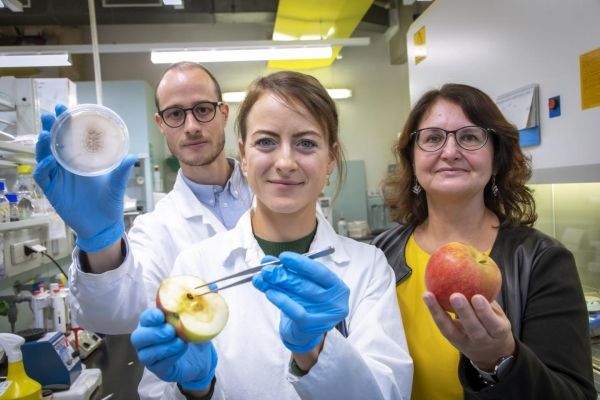The crops have been harvested. Now it is important to store the various crops well and to preserve them as long and as carefully as possible. Post-harvest losses due to spoilage, however, represent a significant problem along the supply chain and lead to profit losses in the millions. According to the FAO (Food and Agriculture Organization of the UN) statistics, almost half of the world's harvest (45 percent) of fruits and vegetables are lost on their way to the end consumer. The main causes of these losses are pest or disease infestation and incorrect storage conditions, which lead to rotting or loss of fresh mass due to respiration and evaporation. The only remedy is often the excessive use of chemicals. Researchers from the Institute of Environmental Biotechnology at TU Graz in cooperation with the Austrian Centre of Industrial Biotechnology (acib) and industrial partners have successfully tested ecological methods that improve the storage of apples and sugar beet – representative examples for other types of fruit and vegetables.
Shelf life of apples significantly increased
Hot water treatment (HWT) has proven to be a sustainable method for reducing fungal fruit decay after harvest in a large number of crops. In this treatment, apples are briefly dipped into a hot water bath. This "heat shock" stimulates the apple's natural defence mechanisms, the principle of action has not yet been fully clarified. Nevertheless, there are always outbreaks of pathogens in storage and apples spoil.
In a laboratory experiment, the head of the Institute of Environmental Biotechnology, Gabriele Berg, PhD student Birgit Wassermann and PhD student Peter Kusstatscher, have now successfully tested a method that significantly improves the shelf life of organic apples through the combined use of HWT and biocontrol organisms. Birgit Wassermann explains the experimental setup: "We infected organic apples with two of the most important putrefactive agents, then treated them with hot water and a biocontrol agent designed by us. This combined approach enabled us to either kill the post-harvest pathogens completely or to reduce the infection diameter to a maximum in about 60 percent of the apples treated in this way." Compared to the control group – apples that were only treated with HWT – the combi-method showed 20 percent better results in the resistance of the apples to storage rot. The additive protective effect of the biocontrol agent obtained from the apple microbiome of native organic apples for the control of the storage moulds could be clearly demonstrated. The results of the study were published in the journal Frontiers in Microbiology.
Read more at Graz University of Technology
Image: Gabriele Berg (right), Birgit Wassermann (centre) and Peter Kusstatscher (left) from the Institute for Environmental Biotechnology at Graz University of Technology in Austria and the Austrian Center of Industrial Biotechnology (acib) developed methods to significantly improve the shelf life of fruit and vegetables and to minimize post-harvest food losses (Credit: Lunghammer - TU Graz)


